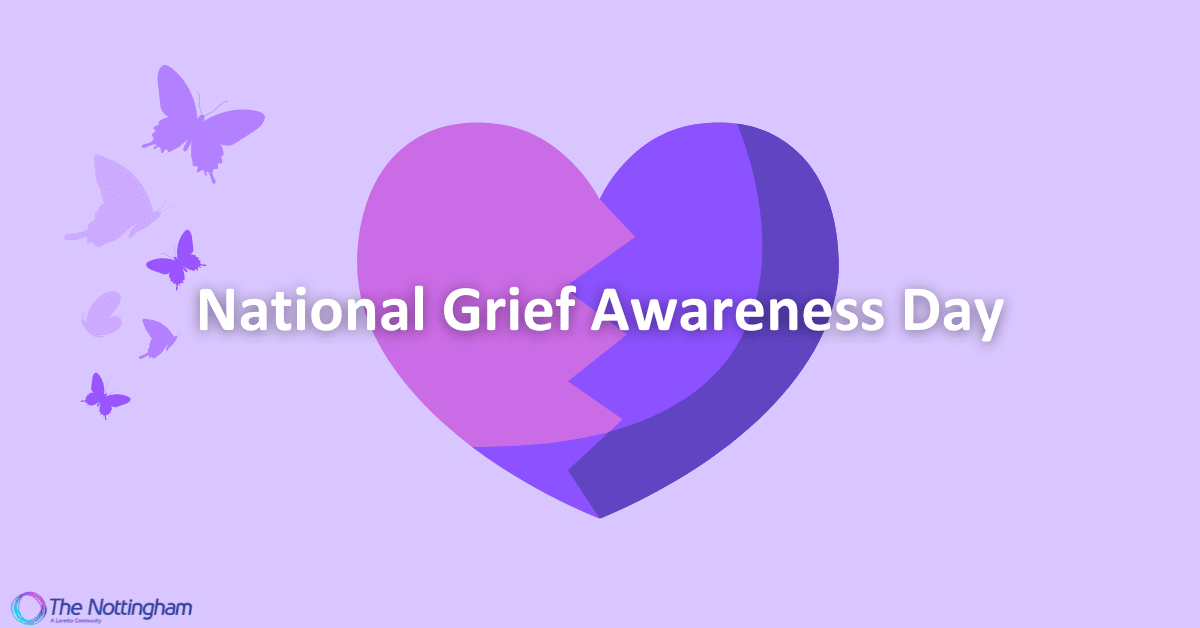
Every year on August 30, we observe National Grief Awareness Day in order to create space for loss and continue to promote an understanding of the importance of how each individual goes through the process of grief. For older adults, the grieving process can be even more complicated to cope with, especially when it comes to the death of a spouse.
The American Psychological Association reports the first year of widowhood can lead to higher incidents of physical and mental issues in older women such as depression and poor social functioning. Older adults might also feel other emotions too after losing a spouse:
- Loneliness
- Depression
- Guilt that they didn’t do more to help their spouse
- Anger
- Denial
- Confusion
- Shocked
While adjusting to a new normal is tough, older adults do not have to go through the grieving process alone, especially if they are living in a senior living community like The Nottingham, which offer amenities in resources that can help older adults grapple with the pangs and realities grief may throw their way.
“There is so much to be gained by being in a community of peers who can relate to one another’s struggles and life changes,” said Kara Gemmell, Director of The Nottingham Independent Living Community, “We have a few structured programs in place regarding caregiving and grief support.”
The Nottingham programs are not just for grieving, but also for caregiving support as well. These include both faith-based and community-oriented groups run by local spiritual leaders. One such group is facilitated by Chaplain Mary Colleen Sinnott, who facilitates one-on-one visits with residents. She also runs a caregiver support group, as well as a group the Chaplain calls “Spirited Aging” which talks about the challenges of aging and finding comfort in faith.
And of course, there is always strength found inside of The Nottingham community among other residents who come to support those going through the ebb and flow of grief.
“There is a group of ladies here who bonded while visiting their husbands who lived in the RHCF. They were all caregivers for many years, including while living together with their spouse in Independent Living. Then their husbands moved to a higher level of care before passing away,” Gemmell said.
Social services organizations will also come in to offer support for residents experiencing grief such as Hope for the Beavered and Onondaga County Aging Services.
In addition, The Nottingham holds a Community Remembrance Service for residents and families to attend so they can celebrate their loved ones.
“We also really try to emphasize the importance of naming and recognizing the passing of someone,” Gemmell said,” If they were living in our community and passed, we light a candle, display their name and share their obituary and reach out to the family and friends to provide support. If their partner passed before they moved to The Nottingham, we want to talk about and name their partner and the life they had together instead of not speaking about them assuming it would ‘hurt too much.'”
How you Can Help Someone Who is Grieving
Knowing how to be there for someone who has just lost their loved one can make a huge difference in their grieving process, especially for an older adult who has lost their longtime spouse.
- Be patient – Let the bereaved grieve at their own pace and in their own way. Also, be aware of the different emotions they may experience during the grieving process such as anger, sadness and anxiety.
- Discuss their spouse – When they mention their loved one, listen as they remember them. Ask them questions and refer to their late spouse by their name.
- Help with Household duties – This can be a particularly painful task because they may have split household duties with their spouse. Having to take on more work than before can also contribute to stress. You can offer help with cleaning and other tasks to lessen the burden.
- Join them for mealtimes – It may help to eat with someone who is grieving, especially if they are now eating alone because they lost their spouse. Some older adults also lose interest in eating or cooking when eating alone, so offering your expertise in the kitchen could encourage them to join you for a meal.
- Watch for signs of depression– Most importantly, monitor older adults for sings of depression. Though depression is often part of the grieving process, it also puts people at a higher risk for poor self-care, isolation, substance abuse and suicidal ideation.
